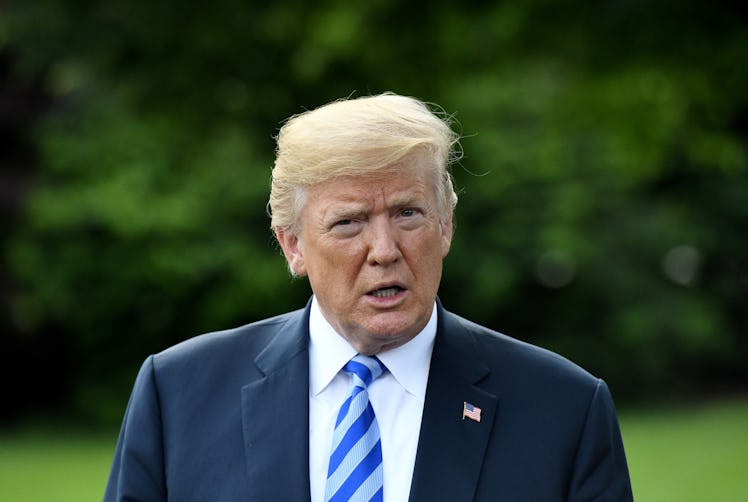
Trump Uninvited The Eagles To The White House & Now They Don’t Have To RSVP No
As you already know by now, the Philadelphia Eagles won the Super Bowl this past year. Normally, the victors visit the White House for a celebration, and it's all fun and games after the big game. That tradition was supposed to carry on this year, but apparently, not if President Donald Trump has anything to say about it, as Trump uninvited the Eagles to the White House. Not that it matters, because now they don't have to go through the trouble of RSVPing no.
The Eagles were expected to visit the White House on Tuesday, June 5, but it looks like Trump has changed his mind. In a statement released by the White House on June 4, Trump said that the players were no longer able to visit because "they disagree with their president," over standing for the national anthem, according to BuzzFeed News. The statement read,
The Philadelphia Eagles are unable to come to the White House with their full team to be celebrated tomorrow. They disagree with their President because he insists that they proudly stand for the National Anthem, hand on heart, in honor of the great men and women of our military and the people of our country. The Eagles wanted to send a smaller delegation, but the 1,000 fans planning to attend the event deserve better.
I'd like to decipher his statement a bit: The majority of the statement seems to point at the fact that Trump doesn't want anyone in the White House who would kneel during the national anthem. But, the point Trump kind of rushed through was the fact that there were quite a few members of the team who had already declined the invitation. So really, Trump is saying, "you all come, or none of you come." A little childish, no?
I think the reason for Trump uninviting the Eagles has more to do with the latter portion of his statement about a "smaller delegation." Translation: not all players were going to show. So in the end, it doesn't matter to the Eagles, because quite a few of them weren't going to show up anyway. Eagles receiver Torrey Smith even pointed that fact out in a June 4 tweet saying "not that many people were going to go." He also noted that the players' decision not to attend was multifaceted, and not just because of the anthem.
In a second tweet, Smith called Trump's actions "cowardly," and had the same thought I did: the real reason Trump cancelled is because most of the players didn't want to go anyway.
Smith wasn't planning on visiting the White House regardless, and he definitely wasn't alone.
Chris Long, who was invited to the White House with the Patriots the year before but did not attend, said that if his new team (the Eagles) should win, he would skip it again. Back in January, on the Pardon My Take podcast, Long was asked if he would visit with the Eagles. "No, I'm not going to the White House," Long responded. "Are you kidding me?"
While he was still on the Patriots, Long explained to Green Stripe News that the reason behind his decision not to visit the White House had to do with his son. Long feared that the consequences of Trump's presidency would be long-lasting and he didn't want his son to one day tell him that it was wrong of him to visit Trump's White house. He said,
My son grows up, and I believe the legacy of our president is going to be what it is, I don't want him to say, 'Hey dad, why'd you go [to the White House] when you knew the right thing was to not go?'
Safety Malcolm Jenkins, another Eagles player who planned to skip the meeting, said that he was simply "not interested in the photo op," according to The Nation. However, he said he'd only meet Trump if the president was interested in discussing the real reason behind the anthem protests — racial injustice. Jenkins said he would only meet to talk about the "advancement in communities of color." He told CNN during a February 5 appearance on New Day,
I want to see changes in our criminal justice system, I want to see us push for ... [economic] and educational advancement in communities of color and low-income communities. And I want to see our relationships between our communities and our law enforcement be advanced.
These football stars aren't just athletes, they are also role models to a lot of people. Not only do kids admire them, but they are in the public eye and therefore have the power to make a statement — whether it's kneeling during the national anthem or RSVPing no to a White House invite. So, I'm sorry Trump, but you're guest list would've been pretty thin anyway.